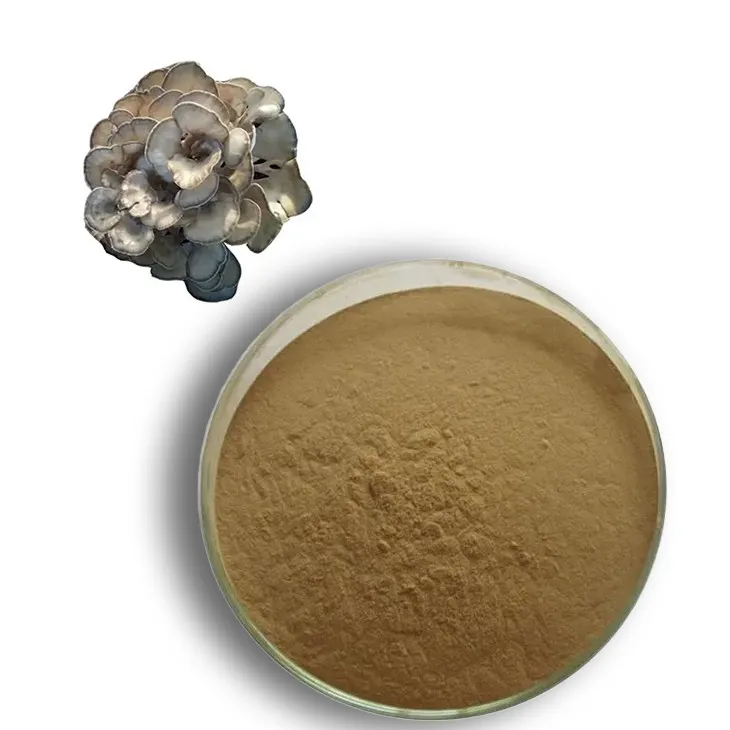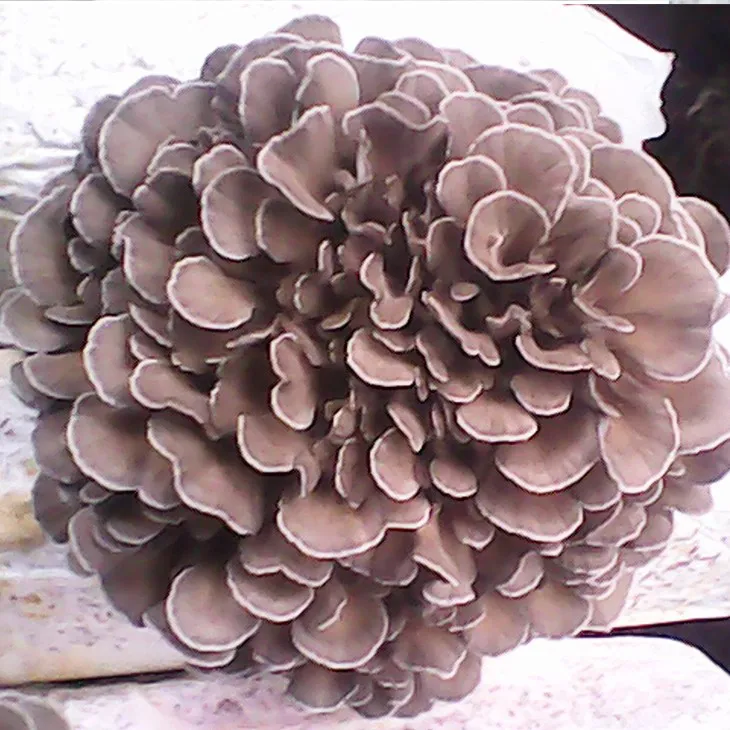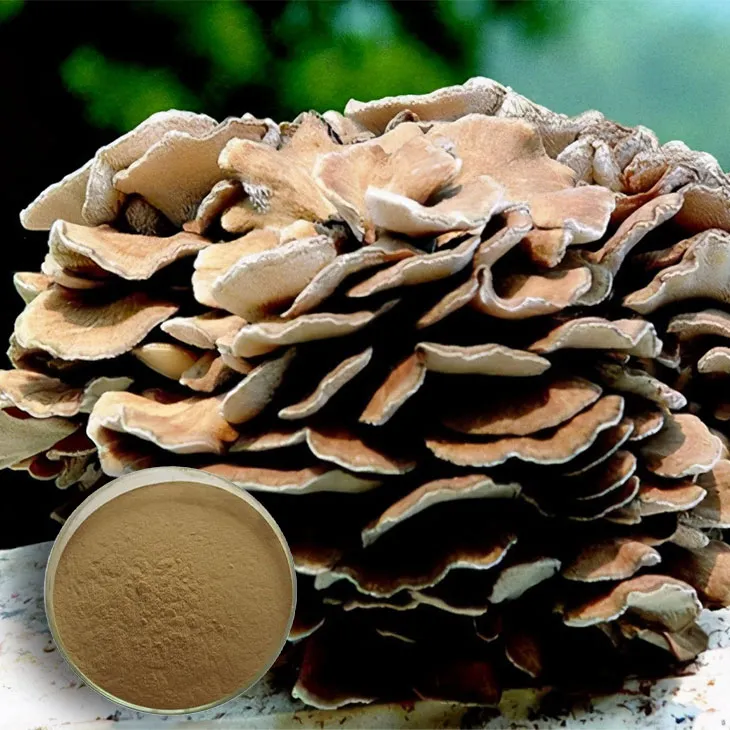- 0086-571-85302990
- sales@greenskybio.com
Optimal Bioavailability of Maitake Mushroom Extract.
2024-11-29

1. Introduction
Maitake mushrooms (Grifola frondosa) have been highly regarded for their potential health benefits. Maitake Mushroom Extract is rich in bioactive compounds such as beta - glucans, polysaccharides, and various antioxidants. However, the bioavailability of these beneficial compounds in the extract can vary significantly. Bioavailability refers to the proportion of a drug or nutrient that enters the circulation and has an active effect. Understanding the factors that influence the bioavailability of Maitake Mushroom Extract is crucial for maximizing its health - promoting effects.

2. Influence of Diet on Bioavailability
2.1 Dietary Fiber
Dietary fiber can both enhance and inhibit the bioavailability of Maitake Mushroom Extract. High - fiber diets can slow down the digestion process. This may be beneficial as it can allow for a more sustained release of the bioactive compounds from the maitake extract. For example, soluble fiber can form a gel - like substance in the gut, which may protect the bioactive components of the maitake extract from rapid degradation and promote their absorption. However, excessive fiber intake can also lead to decreased absorption if it binds too tightly to the compounds in the extract, preventing their release and uptake by the body.
2.2 Fat Content
Fat can play an important role in the bioavailability of maitake mushroom extract. Some of the bioactive compounds in maitake, such as certain lipidsoluble antioxidants, may require the presence of dietary fat for optimal absorption. Lipids in the diet can form micelles with these hydrophobic compounds, facilitating their transport across the intestinal membrane. For instance, consuming maitake extract with a meal containing healthy fats like olive oil or nuts may enhance the absorption of fat - soluble components in the extract. On the other hand, a very low - fat diet may limit the bioavailability of these lipid - associated bioactive substances.
2.3 Protein
Protein in the diet can interact with the components of maitake mushroom extract in various ways. Some proteins may bind to the polysaccharides in the extract, potentially affecting their solubility and absorption. However, certain proteins may also help in the transportation or stabilization of bioactive compounds. For example, some dietary proteins can form complexes with beta - glucans from maitake, which could either enhance or reduce their bioavailability depending on the nature of the complex formed. A balanced diet with an appropriate amount of protein is important for optimizing the absorption of maitake extract components.

3. Processing Techniques and Bioavailability
3.1 Extraction Methods
The method used to extract maitake mushroom extract can significantly impact its bioavailability. Solvent extraction is a commonly used technique. Different solvents can selectively extract different bioactive compounds. For example, ethanol - based solvents may be more effective in extracting certain antioxidants, while water - based extractions are often used for polysaccharides. The choice of solvent and extraction conditions can affect the purity and integrity of the extracted compounds. If the extraction process is too harsh, it may damage the bioactive molecules, reducing their bioavailability. On the other hand, an ineffective extraction method may not fully release the beneficial compounds from the maitake mushrooms, also leading to lower bioavailability.
3.2 Drying and Grinding
Drying and grinding are important steps in the preparation of maitake mushroom extract. Drying helps to preserve the extract but can also affect its physical and chemical properties. For example, high - temperature drying may cause some degradation of heat - sensitive bioactive compounds. Grinding the dried maitake mushrooms into a fine powder can increase the surface area, which may enhance the extraction efficiency and subsequent bioavailability. However, if the grinding process generates too much heat, it can also lead to the destruction of bioactive substances.
3.3 Encapsulation
Encapsulation is a technique used to protect the bioactive compounds in maitake mushroom extract. Microencapsulation can shield the compounds from environmental factors such as light, oxygen, and moisture, which can cause degradation. By encapsulating the extract, it can also improve its solubility and dispersibility in the digestive tract, potentially enhancing bioavailability. For example, encapsulating maitake extract in lipid - based capsules can help in the absorption of lipid - soluble components, especially when consumed with a meal containing fat.

4. Individual Physiological Factors
4.1 Digestive Enzymes
Individual differences in digestive enzyme levels can affect the bioavailability of maitake mushroom extract. For example, some people may have lower levels of amylases or proteases, which are enzymes involved in the breakdown of carbohydrates and proteins respectively. If the polysaccharides or proteins in the maitake extract are not properly broken down by these enzymes, their absorption may be impaired. Digestive enzyme deficiencies can be due to genetic factors, certain medical conditions, or dietary habits. Enzyme supplementation may be considered in some cases to improve the bioavailability of the extract.
4.2 Gut Microbiota
The gut microbiota plays a crucial role in the bioavailability of maitake mushroom extract. Different bacteria in the gut can metabolize the bioactive compounds in the extract in various ways. Some bacteria may break down polysaccharides into smaller, more absorbable molecules, increasing their bioavailability. On the other hand, an imbalance in the gut microbiota, known as dysbiosis, can lead to decreased metabolism of the extract components. Factors such as diet, antibiotic use, and stress can influence the composition of the gut microbiota. Probiotic supplementation and a diet rich in prebiotics can help maintain a healthy gut microbiota and potentially enhance the bioavailability of maitake extract.
4.3 Age and Health Status
Age and health status can also impact the bioavailability of maitake mushroom extract. In elderly individuals, the digestive system may function less efficiently, with reduced secretion of digestive enzymes and slower intestinal motility. This can lead to decreased absorption of the bioactive compounds in the extract. People with certain health conditions, such as gastrointestinal disorders or liver and kidney diseases, may also have impaired absorption or metabolism of the extract. For example, liver diseases can affect the metabolism of bioactive compounds, while kidney diseases may impact their excretion. Nutritional support and appropriate medical management are important for these individuals to optimize the bioavailability of maitake extract.
5. Conclusion
The bioavailability of maitake mushroom extract is a complex issue influenced by multiple factors. Diet, processing techniques, and individual physiological factors all play important roles. To achieve optimal bioavailability of maitake mushroom extract, a balanced diet with appropriate amounts of fiber, fat, and protein should be consumed. The extraction, drying, grinding, and encapsulation processes should be carefully optimized to preserve the integrity and enhance the solubility of the bioactive compounds. Additionally, individual factors such as digestive enzyme levels, gut microbiota, age, and health status should be considered. By taking these factors into account, we can maximize the potential health benefits of maitake mushroom extract.
FAQ:
What is maitake mushroom extract?
Maitake mushroom extract is a concentrated form derived from the maitake mushroom (Grifola frondosa). It contains various bioactive compounds such as polysaccharides, beta - glucans, and other nutrients. These components are believed to have potential health - promoting properties, including immune - enhancing and anti - cancer effects among others.
Why is bioavailability important for maitake mushroom extract?
Bioavailability is crucial as it determines the proportion of the maitake mushroom extract and its active compounds that can be absorbed and utilized by the body. If the bioavailability is low, even if the extract contains beneficial substances, they may not be able to exert their full effects on health. High bioavailability ensures that the body can effectively access and benefit from the nutrients and bioactive components present in the extract.
How does diet affect the bioavailability of maitake mushroom extract?
Diet can have both positive and negative impacts on the bioavailability of maitake mushroom extract. For example, consuming certain fats along with the extract may enhance the absorption of fat - soluble components in the extract. On the other hand, a diet high in fiber might interfere with absorption if consumed simultaneously in large amounts. Also, some foods may contain compounds that either promote or inhibit the absorption of the bioactive substances in the maitake extract through various biochemical interactions in the digestive tract.
What role do processing techniques play in the bioavailability of maitake mushroom extract?
Different processing techniques can significantly affect bioavailability. For instance, extraction methods can determine the concentration and integrity of bioactive compounds. If the extraction process is too harsh, it may damage some of the delicate bioactive molecules, reducing their bioavailability. Conversely, proper extraction techniques can increase the solubility and accessibility of the compounds, thus enhancing bioavailability. Drying methods can also impact the stability and subsequent bioavailability of the extract, as improper drying may lead to degradation of active components.
How do individual physiological factors influence the bioavailability of maitake mushroom extract?
Individual physiological factors such as age, sex, and overall health status play important roles. Younger individuals may generally have more efficient digestive systems, which could potentially lead to better absorption of the extract compared to older adults. Differences in gut microbiota between individuals can also affect bioavailability, as the microbiota can metabolize and transform the compounds in the extract, either making them more or less available for absorption. Additionally, any underlying health conditions that affect the digestive or absorptive functions, such as liver or intestinal diseases, can have a negative impact on the bioavailability of maitake mushroom extract.
Related literature
- Bioavailability of Mushroom Bioactive Compounds: A Review"
- "Maitake Mushroom: Nutritional and Therapeutic Properties and Their Enhancement through Processing"
- "Influence of Diet on the Absorption of Bioactive Compounds from Functional Foods"
- ▶ Hesperidin
- ▶ Citrus Bioflavonoids
- ▶ Plant Extract
- ▶ lycopene
- ▶ Diosmin
- ▶ Grape seed extract
- ▶ Sea buckthorn Juice Powder
- ▶ Fruit Juice Powder
- ▶ Hops Extract
- ▶ Artichoke Extract
- ▶ Mushroom extract
- ▶ Astaxanthin
- ▶ Green Tea Extract
- ▶ Curcumin
- ▶ Horse Chestnut Extract
- ▶ Other Product
- ▶ Boswellia Serrata Extract
- ▶ Resveratrol
- ▶ Marigold Extract
- ▶ Grape Leaf Extract
- ▶ New Product
- ▶ Aminolevulinic acid
- ▶ Cranberry Extract
- ▶ Red Yeast Rice
- ▶ Red Wine Extract
-
Camu Camu Extract
2024-11-29
-
Horse Chestnut Extract
2024-11-29
-
Avocado Extract Powder
2024-11-29
-
Purple Sweet Potato Extract
2024-11-29
-
Kelp Extract Powder
2024-11-29
-
Dandelion Leaf Extract
2024-11-29
-
Apricot Powder
2024-11-29
-
Cocoa Extract
2024-11-29
-
Nettle Root Extract
2024-11-29
-
Curcuma Longa Extract
2024-11-29





















